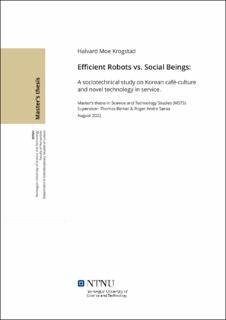| dc.contributor.advisor | Berker, Thomas | |
| dc.contributor.advisor | Søraa, Roger Andre | |
| dc.contributor.author | Moe Krogstad, Halvard | |
| dc.date.accessioned | 2022-09-22T17:20:21Z | |
| dc.date.available | 2022-09-22T17:20:21Z | |
| dc.date.issued | 2022 | |
| dc.identifier | no.ntnu:inspera:107637586:10007895 | |
| dc.identifier.uri | https://hdl.handle.net/11250/3020777 | |
| dc.description.abstract | Sammendrag:
«hvordan roboter brukes i sør-Koreanske kaféer og hvorfor?». I denne oppgaven undersøker jeg dette spørsmålet i en kvalitativ studie på Koreansk kafé kultur, ved å se på hvordan forskjellige komponenter er deltagende når endring skjer og den kompleksitet. Oppgavens introduksjon presenterer nasjonen Korea, et overblikk over leve-situasjonen i Seoul, et kortfattet innblikk i kaffens historie i Korea, hvordan Korea ble en tech-nasjon, definisjonen av en robot, og sist, fremheve tilskuddet denne oppgaven har for ‘untact’- og HRI-forskning. Metodologisk, dette studiet benytter tre typer empirisk materiale: (1) Feltarbeid i Korea og erfaringer fra Seoul, (2) observasjoner av 6 kaféer; 3 robot-kaféer og 3 vanlige kaféer, (3) semi-strukturerte intervju av fire studenter fra Seoul. Informantene er presentert som sine egne individ i denne oppgaven, men de representerer også både kjernen av kafé-kunder og hverdagslivet hos studenter i Seoul. Den empiriske dataen er sentral i denne oppgavens forskning, fordi prosessen er inspirert av grounded theory, en induktiv metodologisk fremgangsmåte. Jeg benytter også teoretiske verktøy fra Science & Technology Studies: sosioteknisk perspektiv, domestisering, og delegering. I tillegg låner jeg Breaching experiments fra sosiologi-feltet.
Oppgaven er kronologisk strukturert inn i fire analysekapittel: (1) et dyp-dykk inn i Koreansk kafé-kultur, det travle livet til studenter, kaféen som en plass å studere på, Seoul’s trange bosituasjon, og de materielle konfigurasjonene på kaféer. Dette utgjør den lokale konteksten for oppgaven. (2) Presentere det sosiotekniske materielle konfigurasjonene i Seoul-kaféer. Analysert gjennom å bli kategorisert og satt opp imot den lokale konteksten, for å finne ut av hvorfor kaféer benytter nye teknologier. Dette utgjør den materielle konteksten. (3) Analysere hvordan kunder domestiserer kaféer som benytter nye teknologier, basert på kaféenes hybridisering, smaken av produkter, og kundenes tekniske kompetanse. (4) HRI-analyse av breaching experiments, ved presentering av tre situasjoner hvor forventingene av sosial interaksjon blir brutt i en service setting, i tillegg til konseptet av å se for seg at brytningene skjer, og avvisningen av untact teknologi i en service setting.
Kaféer i Seoul tilpasser seg den lokale konteksten og studenters rutiner, ved en økende bruk av teknologi og en reduksjon i bruk av menneskelige ansatte, noe som resulterer i at kaféene er på nippet til å bli slike hybrid-kaféer, hvor linjen mellom kafé, hjemmet, og arbeidsplassen blir uklar. I mine funn, vises det at studenter, hoved-målgruppen, er splittet i sin domestisering av robot-kaféer, grunnet avvisning av interaksjon med teknologi i service, basert på mistillit og en forventing om at funksjonsfeil skal skje. | |
| dc.description.abstract | Abstract:
“How robots are used in South Korean cafés and why?”. In this thesis I investigate this question through a qualitative study of Korean café culture, looking at how various components play a part when change occurs in Korean cafés and the complexity of it. The thesis’ introduction present Korea as a nation, an overview of life in Seoul, a brief history of coffee in Korea, the birth of Korea as a tech-nation, a definition of a robot, and lastly highlighting this thesis’ importance and contribution to ‘untact’ and HRI-research. Methodologically, this case study draws on three primary empirical materials: (1) Fieldwork in Korea and experiencing Seoul, (2) observations of 6 cafés; 3 robot-cafés and 3 regular cafés, (3) semi-structured interviews of four Seoul-based students. The informants are presented as their own individuals in this thesis but do also represent the core café customer-group and daily life of students in Seoul. The primary empirical data is central to this thesis’ research as the process is inspired by grounded theory, an inductive methodological approach. Additionally, I utilize theoretical tools from the field of Science & Technology Studies: sociotechnical perspective, domestication, and delegation. I also borrow Breaching experiments from the Sociology field of study.
Chronologically, this thesis is structured in four analysis chapters: (1) a deep-dive into the Korean café-culture, the busy lives of students, the café as a study spot, Seoul’s density and cramped housing, and material configurations of cafés. This constitutes the local context of this thesis. (2) Presenting the sociotechnical material configurations in Seoul cafés. Analyzed by being categorized and put up against the local context, figuring out why cafés make use of novel technology. This constitutes the material context. (3) Analyzing how customers domesticate cafés using novel technologies, based on the cafés hybridity, taste of products, and the customers technical competence. (4) HRI-analysis of breaching experiments, presenting three cases of breaching in social expectations of interactions in a service setting, in addition to the concept of imagined breaching and rejection of untact technology in a service setting.
The Seoul café is adapting to the local context and students’ routines, by increasingly making use of technologies and reducing the number of human employees, resulting in some cafés becoming borderline hybrids, blurring the line between café, home, and workplace. Findings show that students, the target customer, are divided in domesticating robot-cafés, due to rejection of interacting with technology in service based on untrust and anticipatory fear of malfunction. | |
| dc.language | eng | |
| dc.publisher | NTNU | |
| dc.title | Efficient Robots vs. Social Beings:
A sociotechnical study on Korean café-culture and novel technology in service. | |
| dc.type | Master thesis | |
